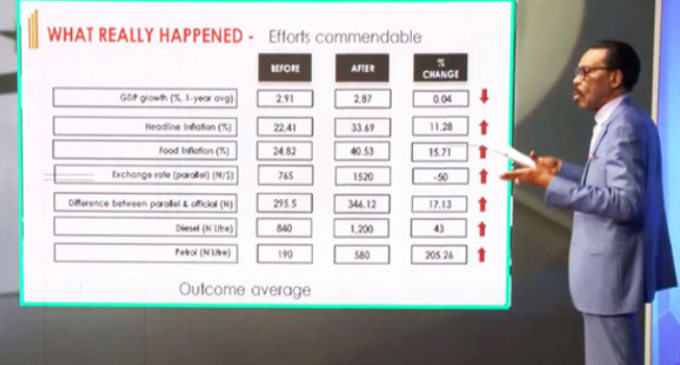Frontline economist and social critic, Bismarck Rewane, has lamented that Nigeria is now trailing its rival neighbour, Ghana, in economic growth.
Rewane disclosed that Nigeria has plummeted from the 32nd largest economy in the world to 42nd, and also lost its position as first to appear as fourth in wealth management and accumulation.
According to the renowned economist, Ghana has left Nigeria behind in economic exploits of the West African region.
Rewane said this during his economic scorecard and presentations on Channels Television.
“In the past, we were always richer than Ghana, now we are here. External reserves and GDP figures speak for themselves,” Rewane said.
Rewane, who was among the appointed members of President Bola Tinubu’s Economic Management Team Emergency Task Force (EET), rated the country’s economic performance low.
While saying there is room for improvement in the Nigerian economy, he added that the economic metrics and rankings look tough.
He said, “Our ranking among African countries has declined. Last year, our GDP growth was 2.98 per cent; South Africa was 1.93 per cent, Kenya four per cent, and Ghana 3.8 per cent. Inflation was 33 per cent for us, five per cent for South Africa, five per cent for Kenya, and 25 per cent for Ghana.
“Our GDP per capita is $1,111, while South Africa’s is $6,700, Kenya’s is $2,000, and Ghana’s is $2,200. External reserves as a percentage of GDP illustrate a tough picture.
“In the past, we were always richer than Ghana, but now we are here. External reserves and GDP figures speak for themselves.
“There’s a cost of living crisis in Nigeria, and minimum wage negotiations are a source of widespread conflict. The wrong sequencing of reforms is taking its toll on output. Nigerians and Nigeria need new borrowing to refinance existing obligations, and policy changes, institutional reforms, and new borrowings are expected to lead to positive and faster growth from 2025 to 2026.
“The economic weakness is partly structural and mostly exogenous. Exogenous means from outside, while structural means fundamental. The structural challenges include rent-seeking, market structure issues, energy crunch (4,000 MW), regulatory bottlenecks, declining labour productivity, and demographic pressures including urbanization.”
“Exogenous shocks include COVID-19 disruptions, post-COVID global supply chain disruptions, political tensions, high global interest rates, transit developments, the cost of living crisis, wage agitation, and social unrest,” Rewane said.
The Economist also reviewed Tinubu’s promises, policies, and announcements a year after his assumption in office, with no results to show in the last one year.
He said, “The first promise President Tinubu made was to increase GDP to $1 trillion in eight years. Before then, our GDP was almost $400 billion, so he aimed to double it in eight years.
“He removed petroleum subsidies, unified exchange rates, promised to overhaul the security infrastructure, and also promised to double power generation from 5,000 MW to 10,000 MW in 5 years, which means an increase of 1,250 MW every year.
“Additionally, he promised to bring inflation under control. These were the promises, policies, and announcements.”

 Join Daily Trust WhatsApp Community For Quick Access To News and Happenings Around You.
Join Daily Trust WhatsApp Community For Quick Access To News and Happenings Around You.


